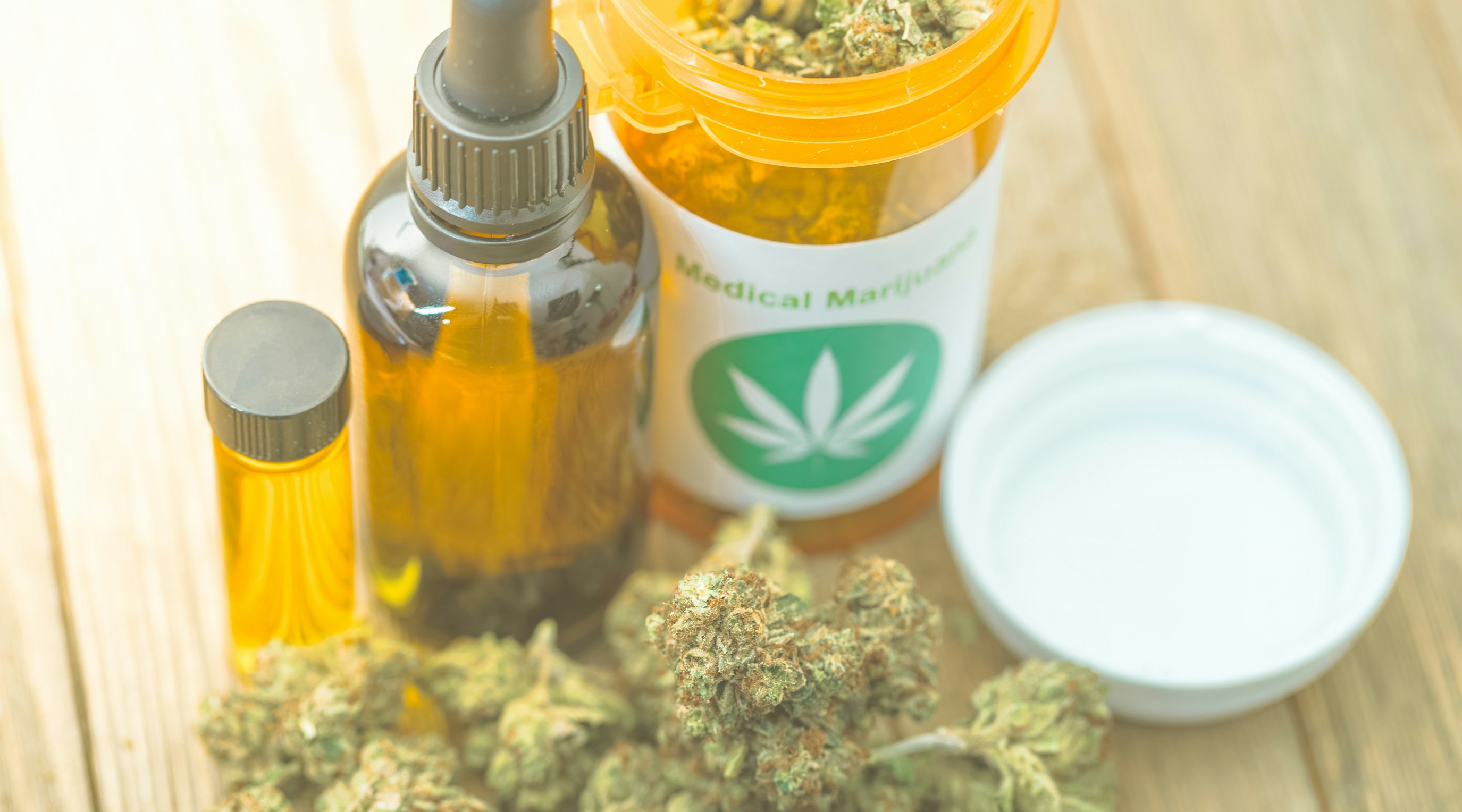A complete guide to medical cannabis
9 min read
Sam North
Contents
As medical cannabis continues to rise in popularity both globally, and here in the UK, patients suffering from a vast range of both physical ailments and mental health issues are increasingly turning to this natural remedy in the hope of finding symptomatic relief.
Legislation passed in November 2018 made access to medicinal cannabis a reality here in the UK, and in the years since we have seen a slow but steady increase in prescriptions.
Cannabis sativa L. is a plant with numerous chemical compounds (cannabinoids, terpenes, and flavonoids) shown to have the potential for therapeutic and wellness effects. Among those cannabinoids, the most studied for their potential use in cancer treatment are delta-9 tetrahydrocannabinol (THC) and cannabidiol (CBD).
There is a growing body of scientific evidence which suggests that medical cannabis may be an effective treatment option for managing symptoms associated with cancers such as pain, nausea or loss of appetite.
Today, we’ll explore the different forms of medical cannabis available to UK citizens and offer practical guidance on how you can access the treatment and support you need in a safe and effective way. Medical cannabis should never be viewed as a cure for cancer. It may, however, provide an effective and relatively safe way to manage symptoms associated with the disease.
What is medical cannabis?
Medical cannabis refers to the administration of the cannabis plant or its various molecular compounds to aid in the relief of symptomatic issues and enhance overall wellness.
The cannabis plant produces more than 110 different cannabinoids, along with a range of terpenes and flavonoids. While research is still continuing into the role each of these compounds may play, they each have a unique effect on the mind and/or body.
Some cannabinoids are psychoactive and can alter your perception and mood, while others have no intoxicating effect while still delivering potential therapeutic benefits.
The two cannabinoids mentioned above, THC and CBD, are found in the highest concentrations in the cannabis plant and are often taken together (and in harmony with terpenes and other cannabinoids) to generate what is referred to as the entourage effect - where the compounds work synergistically to produce a more powerful overall therapeutic effect.
A brief history of medical cannabis
Cannabis as a medicine has a long, complex history that dates back thousands of years, reaching beyond recorded history.
According to the Cannabis and Cannabinoid Research journal, ancient Chinese texts from 2900 B.C. mention the administration of cannabis for “constipation, rheumatic pain, female reproductive tract disorders, and malaria. Furthermore, the plant was used in conjunction with wine to anaesthetise patients during surgical procedures”. These quotes come directly from the Shennong Ben Cao Jing, a Chinese encyclopedia on agriculture and medicine, which contains the oldest known written records of cannabis as a medicine.
And while China may have the oldest known records, medical cannabis appears to predate even those accounts. In a review published in Frontiers in Plant Science, researchers propose that “there is evidence for cannabis being used as a medicine many centuries before the earliest written records.”
Ancient Greek and Roman texts also mention the application of cannabis as a medicine, and it was traditionally used in India and Sri Lanka as part of Ayurvedic medicine. South East Asia also has a long history of cannabis use, and even in Europe, the plant was widely taken to treat a range of medical issues until the early 20th century when it became increasingly frowned upon.
Medical cannabis was only introduced into Western medicine in 1841 when Irish physician William O’Shaughnessy was first exposed to its potential in medical contexts while living in India. Upon his return to Ireland, he wrote about its possible ability to reduce convulsions in child patients, and became a strong proponent of medical cannabis, introducing it to hospitals and physicians throughout Europe.
Fast-forward to the modern day, and the push for full access to medical cannabis has been gaining traction globally since the late 1990s. Now, more than ever, we are seeing an increased amount of research into this fascinating plant and its potentially beneficial effects for use in medicinal contexts.
Types of medical cannabis
With the growing interest and availability of medical cannabis in the UK, you may be wondering what types of medicinal cannabis products are available. The veritable smorgasbord of options includes:
- Dried cannabis flower: Vaporised cannabis flower offers the most immediate symptom relief and can be used for a range of medical conditions.
- Edibles: Cannabis edibles, such as gummies, cookies, chocolates, etc. can be used to manage chronic pain or assist with sleep.
- Oils and capsules: Cannabis oil capsules are a great way to access medical cannabis without smoking or vaping, making them an ideal choice for those who want to avoid inhalation of any kind.
- Topicals: Cannabis topicals are applied directly to the skin and are used to treat localized pain, inflammation, arthritis, and a range of skin conditions.
- Tinctures: Cannabis tinctures are alcohol extractions of cannabis that can be applied directly under the tongue for fast-acting relief.
The potential medical benefits of cannabis
A growing body of medical research continues revealing evidence suggesting that cannabis may have a wide range of wellness and health benefits.
The benefits of medical cannabis may include:
- Relief from chronic pain and inflammation.
- Reduction in nausea and vomiting caused by chemotherapy or other treatments.
- Stimulation of appetite.
- A decrease in the symptoms of anxiety and depression, as well as the ability to reduce PTSD symptoms in some patients.
- Relief from muscle spasms caused by diseases such as multiple sclerosis.
- Protection of nerve cells from damage, and possibly even the regeneration of new nerve cells.
- A reduction in seizures or epileptic episodes.
- Potentially slowing down or halting the progression of some forms of cancerous tumours by choking off their blood supply. Medical cannabis is not a cure for cancer.
- Improving overall health by providing antioxidants and neuroprotective effects, as well as helping to reduce the risk of developing cardiovascular disease.
- Symptomatic control for gastro-intestinal issues including IBS, Crohn’s disease, and ulcerative colitis.
The National Library of Medicine provides 24 databases consisting of over 100,000 pieces of research on medical cannabis.
Even though the current state of medical cannabis research has continued to rapidly progress in recent years, it has become apparent that there is still much to learn. Myriad studies have examined the benefits and risks, yet more research is still necessary to establish the true and full potential to create more standardised guidelines for specific medicinal needs.
THC and CBD are the two most studied cannabinoids, but more studies are needed to better understand the other unique compounds found in medical cannabis. As new findings emerge, healthcare professionals can develop even more efficient treatments and protocols as they continue to assess the potential benefits of medical cannabis.
It’s critical to remember that the effects and benefits of medical cannabis can vary between individuals. Before taking any form of medical cannabis, it’s imperative that you first consult a healthcare professional.
Legal and regulatory considerations
Legal requirements are crucial factors to consider when starting your medical cannabis journey. By following these rules carefully, patients can safely access the benefits of medical cannabis while staying within the boundaries of the law.
The current legal status of medical cannabis in the UK
The legal status of medical cannabis varies across countries and regions, while laws continue to change as more people become aware of the powerful potential of medical cannabis.
In the UK, medical cannabis became a reality in 2018 and is fully legal when patients have been prescribed it by a specialist doctor.
Requirements for obtaining medical cannabis
In the UK, to qualify for medical cannabis, the first typical step is to obtain a doctor’s recommendation. This will state that you have one of the qualifying conditions listed for which you may receive a cannabis prescription once other treatments have been explored.
Once your doctor approves you for medical cannabis, it’s essential that you understand the renewal process to make sure that you can have ongoing access to medicinal cannabis.
Regulations regarding cannabis consumption and driving in the UK
In the UK, driving under the influence of cannabis is illegal, as it can impair vital cognitive functions and can slow down your reaction time, while also distorting your perception. This applies even if you have a medical cannabis prescription. CBD-based products do not cause intoxication. Driving is permitted while taking CBD-based products that contain less than 0.2% THC.
Patients who take medical cannabis containing elevated levels of THC, which causes impairment, should be aware of the potential risks and take necessary precautions before driving or operating heavy machinery.
Last thoughts on medical cannabis
Medical cannabis is a revolutionary new form of medical treatment, with the obvious potential to help many individuals who suffer from various debilitating conditions. With its newfound legality in the UK, more and more people can now access this powerful natural medicine and take advantage of its potential benefits.
Releaf understands that embarking on your medical cannabis journey can be intimidating - that’s why we offer tailored monthly packages, specialist consultations for medical cannabis, and our unique medical cannabis card to give you the peace of mind that your treatment is protected, all based on your medical cannabis prescription.
We are passionate about helping our patients access the best possible health outcomes through the application of medical cannabis. Contact us today and let’s take action together.
Share article
Did you like this article?
It is important to seek medical advice before starting any new treatments. The patient advisors at Releaf are available to provide expert advice and support. Alternatively, click here to book a consultation with one of our specialist doctors.
Elevate your wellness with medical cannabis
Get comprehensive care, convenience, and confidence with an all-in-one treatment plan.
Am I eligible?Authors
Sam North, a seasoned writer with over five years' experience and expertise in medicinal cannabis, brings clarity to complex concepts, focusing on education and informed use.
medically reviewed
fact checked
Compliance Director
Editorial Policy
All of our articles are written by medical cannabis experts, guided by strict sourcing guidelines, and reference peer-reviewed studies and credible academic research. Our expert clinical team and compliance specialists provide valuable insights to ensure accuracy when required. Learn more in our editorial policy.
Need more help?












